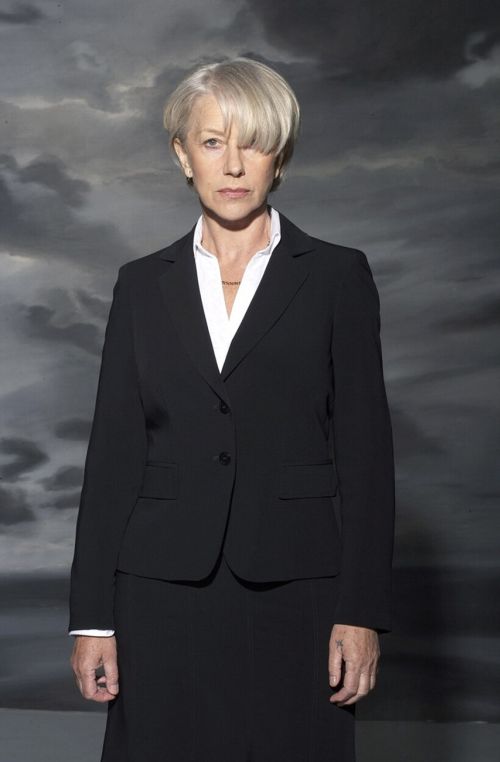
 Before there was The Cooler, before there was either version of The Killing, and obviously before there was Maria Bello’s short-lived Americanized take, there was Dame Helen Mirren as Jane Tennison, one of the canonical figures of action heroine television over the past two decades. Though only fifteen feature-length episodes were aired – that works out at only one a year between the show’s debut in 1991, and its finale in 2006 – it has become an archetype for its portrayal of a female detective, relentless in her pursuit of criminals, but considerably more ill at-ease and abrasive when handling the people with whom she has to work. She’s great at spotting clues, interrogating suspects and putting together the pieces. However, Tennison’s personal life is a complete mess, she screws up any relationships on an almost daily basis, and is completely incapable of striking a balance between work and everything outside it.
Before there was The Cooler, before there was either version of The Killing, and obviously before there was Maria Bello’s short-lived Americanized take, there was Dame Helen Mirren as Jane Tennison, one of the canonical figures of action heroine television over the past two decades. Though only fifteen feature-length episodes were aired – that works out at only one a year between the show’s debut in 1991, and its finale in 2006 – it has become an archetype for its portrayal of a female detective, relentless in her pursuit of criminals, but considerably more ill at-ease and abrasive when handling the people with whom she has to work. She’s great at spotting clues, interrogating suspects and putting together the pieces. However, Tennison’s personal life is a complete mess, she screws up any relationships on an almost daily basis, and is completely incapable of striking a balance between work and everything outside it.
Such a complex character requires an actress of the highest talents, and Mirren provides it. Before her film career, she cut here teeth with the Royal Shakespeare Company, though her early cinematic work includes both classic (The Long Good Friday) and entries which one suspects she’d rather forget (Caligula!). But even in the latter, she still carried herself with grace and poise, elevating the material. By the early nineties, she was respwected, yet not quite as renowned as she would become – her first Oscar nomination would not be until 1994, for The Madness of King George. Even now, Mirren acknowledges the show’s importance in her career: “It was an incredibly important part of what’s got me to where I am today. It was intense, many many hours on a set with many different directors, many different writers. I loved it, and that’s the way you learn.” Series creator Lynda LaPlante was also well established, having previously created a similarly iconic female character, on the other side of the law, in Dolly Rawlins, for her crime series, Widows.
While far from the first to portray a British female detective, the new show was a fairly-radical departure from previous entries such as Juliet Bravo or The Gentle Touch which, as the latter’s name suggests, sought to portray a kinder, gentler police force, with heroines comfortable at both home and work. LaPlante was having none of that, placing Jane Tennison in situations which contrasted her skills at police-work with her abject failures elsewhere (the show wisely chooses to focus much more on the former). Right from the start, Tennison has to prove herself in a male-dominated environment against the constant suspicion that she reached her position because of affirmative action, rather than on merit. Finding the right person for the role was crucial, LaPlante told NewsWeek in 1994, “She’s not physically heavy, but she has a strength inside her that is unusual. There’s a stillness to her, a great tension and intelligence in her face.”
One of the fascinating things about the show is the change that Tennison undergoes over the course of the series, which is particularly apparent if you watch them all in relatively short order. It would be hard to imagine an American show sticking with the same character over such a long period, but the infrequency of the production likely helps, and we see Tennison evolve over the length of the show from a somewhat tentative and naive detective, becoming hard-bitten and cynical (for very good cause), eventually ending up an alcoholic, teetering on the edge of complete burn-out and suffering from blackouts and the DTs, who is trying to solve one last case reach retirement through sheer, bloody-minded willpower. It’s a fascinating arc to watch, and I particularly appreciated the way, at the end of the final episode, the writers didn’t provide an obvious or “fluffy” ending, which could have compromised the integrity of the entire show.
| “Women are taught to smile, to be pleasant, to be charming, to be attractive. Tennison doesn’t do that. She is driven, obsessive, vulnerable, unpleasantly egotistical, and confused. But she is damn good at what she does and is totally dedicated.” — Helen Mirren |
Mirren is the sole character to appear in all the episodes. She’s supported by a swathe of faces you’ll recognize if you spend any time watching British television or movies. The first series alone included future Oscar nominees Tom Wilkinson and Ranulph Fiennes, as well as Zoe Wanamaker, and others to be seen include David Thewlis, Ciaran Hinds, Jonny Lee Miller, Mark Strong, Frank Finlay and Peter Capaldi, recently announced as the new Dr. Who [in Suspect, he plays a transvestite, which is certainly… different]. Most of the series are single stories, told over two 100-minute episodes, except for the fourth, which is a trio of individual parts. This extended length, allowing a single crime to be dissected in greater depth, is another difference to American shows, which tend very much to be “crime of the week,” with or without also a longer story arc.
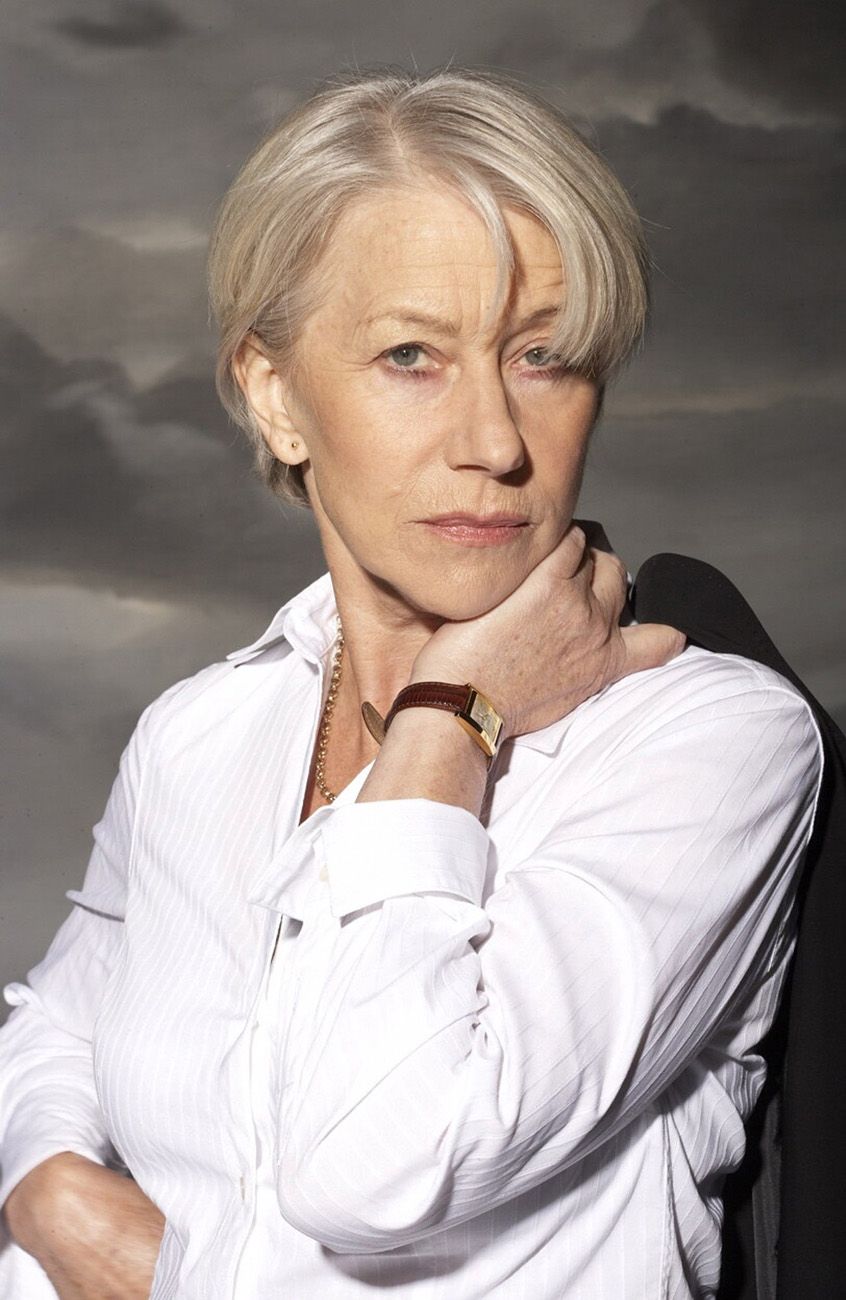 While all the cases are homicides, they cover a wide breadth. After the first season, there tended to be an underlying social issue: this could be racial, political or class-based, and often provide an additional level of difficulty to the investigation. Particularly in the early seasons, Tennison is depicted as having to fight prejudice from her colleagues. The feminist aspects (perhaps thankfully) do fade somewhat, once she becomes more established, though the level of support she gets from her superiors is never something on which she can rely. Throughout, she struggles with self-doubt and loneliness in her position, no-one able to understand the pressures of the job, and help share the burden on her shoulders. But part of her strength is that it never interferes with her dedication to the case, or her pursuit of those responsible for wrong-doing. Unlike a good number of her colleagues, who are sometimes prepared to sacrifice justice for the sake of expediency, Tennison’s morality is absolute, and she won’t compromise it for anything, regardless of the potential personal cost.
While all the cases are homicides, they cover a wide breadth. After the first season, there tended to be an underlying social issue: this could be racial, political or class-based, and often provide an additional level of difficulty to the investigation. Particularly in the early seasons, Tennison is depicted as having to fight prejudice from her colleagues. The feminist aspects (perhaps thankfully) do fade somewhat, once she becomes more established, though the level of support she gets from her superiors is never something on which she can rely. Throughout, she struggles with self-doubt and loneliness in her position, no-one able to understand the pressures of the job, and help share the burden on her shoulders. But part of her strength is that it never interferes with her dedication to the case, or her pursuit of those responsible for wrong-doing. Unlike a good number of her colleagues, who are sometimes prepared to sacrifice justice for the sake of expediency, Tennison’s morality is absolute, and she won’t compromise it for anything, regardless of the potential personal cost.
Obviously, this isn’t “action” in the “fisticuffs and car-chase” mould of policework (I’ll refer you to Red and its sequel if you want to see Mirren wielding the heavy weaponry!). Virtually the only weapons Tennison wields are her mind and her tongue, but it’s hard to tell which is the sharper, and they are both undeniably effective at getting to the truth, no matter how deeply it may be hidden. Her bravery is undeniable, not just in the perpetual quest for justice mentioned above, but her willingness to put herself into potentially lethal situations when the need arises., such as at the end of the fifth series where she faces an armed suspect, alone and without anything to protect her. While it’s one thing to go into such situations with the physical presence to handle them, doing so when you don’t have such an ability, is probably even more courageous.
Though some episodes are now more than 20 years old, they hardly seem dated at all: the writing is still sharp as a razor, and can stand with anything you’ll find on television today. But it’s Mirren’s performance which makes this work, and is why I just didn’t bother with the US remake; good though Bello might be, she can’t hold a candle to the original. There’s a reason Mirren was nominated for six Emmys, winning two, and six BAFTAs, taking home three. Virtually every cop show with a female lead which has come out since – or, at least, all the good ones – owe something to Prime Suspect, and a central character who embodies the tension between work and home life. Never shying away from the darker side of law-enforcement, or the toll it exerts on those who maintain it, this isn’t just one of the best recent action heroine TV series, it’s among the best TV series of any genre or era.





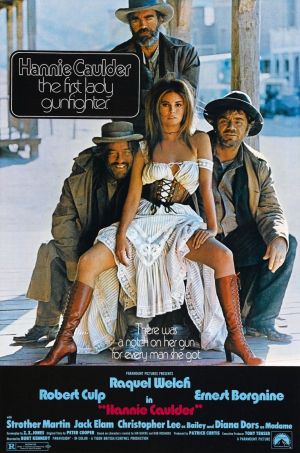 If genre entries produced in Italy are “spaghetti Westerns”, what does that make those produced in Britain? “Fish and chip Westerns?” “Roast beef Westerns?” Shot in Spain, but made by Tigon Film, and including such quintessential Brits as Christopher Lee and Diana Dors in supporting roles, this is nicely-photographed and hits all the right notes. But as the titular character, who seeks revenge after her husband is gunned down, and she herself raped, by the Clemens brothers, Welch perhaps has too much cinematic baggage. While responsible for one of the all-time absolute
If genre entries produced in Italy are “spaghetti Westerns”, what does that make those produced in Britain? “Fish and chip Westerns?” “Roast beef Westerns?” Shot in Spain, but made by Tigon Film, and including such quintessential Brits as Christopher Lee and Diana Dors in supporting roles, this is nicely-photographed and hits all the right notes. But as the titular character, who seeks revenge after her husband is gunned down, and she herself raped, by the Clemens brothers, Welch perhaps has too much cinematic baggage. While responsible for one of the all-time absolute  In the late seventies, British television was notable for series which generally kicked ass on the performance front, but suffered from woefully inadequate production values. The most well-known example is Doctor Who, but that was just the tip of a dramatic iceberg which included the likes of Blake’s 7 and this series: in some cases, you can look past or ignore the deficiencies, because the acting is good enough to counteract them. That, sadly, isn’t the case here, with Phillips (a compatriot of Diana Rigg and Glenda Jackson at RADA) sadly adrift as Boudicca, the queen of the Iceni who takes on the occupying Roman forces after her daughters are assaulted. Having enjoyed the 2003 version, with Alex Kingston in the title role, I thought I’d give this one a chance, but when a supposed army of 6,000 is represented by four chariots and, maybe, ten guys in animal skins, it’s hard not to notice.
In the late seventies, British television was notable for series which generally kicked ass on the performance front, but suffered from woefully inadequate production values. The most well-known example is Doctor Who, but that was just the tip of a dramatic iceberg which included the likes of Blake’s 7 and this series: in some cases, you can look past or ignore the deficiencies, because the acting is good enough to counteract them. That, sadly, isn’t the case here, with Phillips (a compatriot of Diana Rigg and Glenda Jackson at RADA) sadly adrift as Boudicca, the queen of the Iceni who takes on the occupying Roman forces after her daughters are assaulted. Having enjoyed the 2003 version, with Alex Kingston in the title role, I thought I’d give this one a chance, but when a supposed army of 6,000 is represented by four chariots and, maybe, ten guys in animal skins, it’s hard not to notice. Probably best to approach this with few expectations of this being a factual representation of the time; more than once, it felt clearly like the writer was using the Roman occupation of Britain, and Boudica’s rebellion, as a metaphor for American’s involvement in Iraq. There are certainly enough anachronisms, particularly in the dialogue (the Roman Emperor chatting informally away with the leader of a British tribe, and references to “terrorists”), that it seems deliberate. The basic story is the one well-known of legend: after her husband’s death, and the raping of her daughters by the invading Romans, Boudica (Kingston) led her tribe in an initially successful revolt, only to be stopped when the full force of the Empire was turned on them.
Probably best to approach this with few expectations of this being a factual representation of the time; more than once, it felt clearly like the writer was using the Roman occupation of Britain, and Boudica’s rebellion, as a metaphor for American’s involvement in Iraq. There are certainly enough anachronisms, particularly in the dialogue (the Roman Emperor chatting informally away with the leader of a British tribe, and references to “terrorists”), that it seems deliberate. The basic story is the one well-known of legend: after her husband’s death, and the raping of her daughters by the invading Romans, Boudica (Kingston) led her tribe in an initially successful revolt, only to be stopped when the full force of the Empire was turned on them.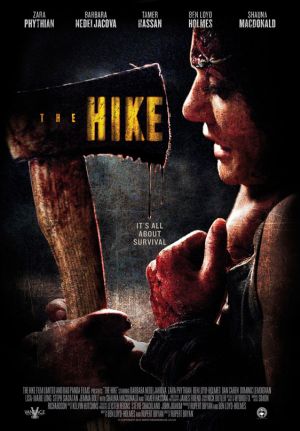 Five young women head out into the country for a camping trip, led by Kate (Phythian), a former soldier who is stil traumatized by seeing her boyfriend killed in front of her while on a mission in the Middle East. She’s about the only member of the party who seems genuinely keen on the trip, and it’s not long before the others start to whine, demanding rest stops, and the hike is curtailed before the intended destination. At least the country is not entirely deserted, though the creepy East European guy and his two women isn’t exactly sociable. But at least there are the three nice guys, out for a spot of rock-climbing, led by Ethan (Loyd Holmes), so there’s always that. And if things end up getting dicey – say, if one of the women vanishes mysteriously, while out gathering firewood, the others can turn to Ethan and his chums for help. Right? Right?
Five young women head out into the country for a camping trip, led by Kate (Phythian), a former soldier who is stil traumatized by seeing her boyfriend killed in front of her while on a mission in the Middle East. She’s about the only member of the party who seems genuinely keen on the trip, and it’s not long before the others start to whine, demanding rest stops, and the hike is curtailed before the intended destination. At least the country is not entirely deserted, though the creepy East European guy and his two women isn’t exactly sociable. But at least there are the three nice guys, out for a spot of rock-climbing, led by Ethan (Loyd Holmes), so there’s always that. And if things end up getting dicey – say, if one of the women vanishes mysteriously, while out gathering firewood, the others can turn to Ethan and his chums for help. Right? Right?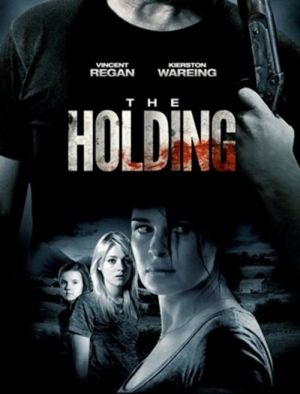 Cassie Naylor (Wareing) is struggling to keep her head above water on the farm she’s now running almost single-handed, eight months after her husband vanished. What the locals don’t know is that she buried him in a remote spot on the Derbyshire moors, with the help of part-time farmhand Cooper (Bradley), for reasons not initially clear. The arrival of a transient, Aden (Regan, looking not unlike a rougher version of Gerard Butler), seems like a godsend, and they agree he can work in exchange for food and lodgings. However, it’s not long before Aden’s less-desirable tendencies start to show through. While he’s fiercely loyal – dispatching anyone whom he perceives as a threat – he seems to regard Cassie and her two daughters as “his” family, and seems to know rather too much about them.
Cassie Naylor (Wareing) is struggling to keep her head above water on the farm she’s now running almost single-handed, eight months after her husband vanished. What the locals don’t know is that she buried him in a remote spot on the Derbyshire moors, with the help of part-time farmhand Cooper (Bradley), for reasons not initially clear. The arrival of a transient, Aden (Regan, looking not unlike a rougher version of Gerard Butler), seems like a godsend, and they agree he can work in exchange for food and lodgings. However, it’s not long before Aden’s less-desirable tendencies start to show through. While he’s fiercely loyal – dispatching anyone whom he perceives as a threat – he seems to regard Cassie and her two daughters as “his” family, and seems to know rather too much about them. Five mountaineers are exploring the remote Scottish highlands, when they stumble across an underground box containing a terrified, near-dead young girl who speaks no English. Two of the party are sent, by the most direct but not child-friendly route, back to civilization to get help, but it’s not long before they discover the parties who buried the girl are not too happy with her removal. For they are two kidnappers, Mr. Kidd (Harris, who also plays a psychotic killer in The Borgias) and Mr. McRae who are negotiating with her father’s emissary, Darko (Roden) to pay the ransom, not aware that Darko has hired some ex-soldiers to resolve the matter. Having lost the child, the pair set out to recapture her, and don’t care how many bodies are left in their wake.
Five mountaineers are exploring the remote Scottish highlands, when they stumble across an underground box containing a terrified, near-dead young girl who speaks no English. Two of the party are sent, by the most direct but not child-friendly route, back to civilization to get help, but it’s not long before they discover the parties who buried the girl are not too happy with her removal. For they are two kidnappers, Mr. Kidd (Harris, who also plays a psychotic killer in The Borgias) and Mr. McRae who are negotiating with her father’s emissary, Darko (Roden) to pay the ransom, not aware that Darko has hired some ex-soldiers to resolve the matter. Having lost the child, the pair set out to recapture her, and don’t care how many bodies are left in their wake. I could hear Chris’s eyes rolling when the title came up – I can’t blame her, as the viewing immediately followed Virgin Commandos, whose mere name sent her scurrying off to Facebook poker. This, however, was not the soft-porn flick she anticipated. Instead, it’s a comedy, somewhat spoofing Gladiator, but its closest cousin is likely Carry On Cleo. That said, it’s undeniably gynocentric, with the three heroines about the only competent characters on either side.
I could hear Chris’s eyes rolling when the title came up – I can’t blame her, as the viewing immediately followed Virgin Commandos, whose mere name sent her scurrying off to Facebook poker. This, however, was not the soft-porn flick she anticipated. Instead, it’s a comedy, somewhat spoofing Gladiator, but its closest cousin is likely Carry On Cleo. That said, it’s undeniably gynocentric, with the three heroines about the only competent characters on either side.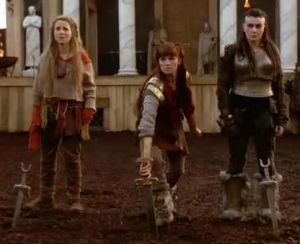 The action is undeniably limited, being played more for laughs than excitement – the much-fabled ‘Celtic Kick’, turns out to be not quite what you think. Of course, this being British humour, there are also fart and willie jokes, but works because the characters have foibles and quirks to render them human. Smirgut has lost her inner warrior since motherhood; Dwyfuc is thoroughly unimpressed by the men available to her, and Worthaboutapig has long-standing self-esteem issues – unsurprisingly, really, given her name. The results are heroines who are likeable, as well as being brave and resourceful. I found the results very refreshing, with better-drawn characters than many bigger budget movies. That was definitely
The action is undeniably limited, being played more for laughs than excitement – the much-fabled ‘Celtic Kick’, turns out to be not quite what you think. Of course, this being British humour, there are also fart and willie jokes, but works because the characters have foibles and quirks to render them human. Smirgut has lost her inner warrior since motherhood; Dwyfuc is thoroughly unimpressed by the men available to her, and Worthaboutapig has long-standing self-esteem issues – unsurprisingly, really, given her name. The results are heroines who are likeable, as well as being brave and resourceful. I found the results very refreshing, with better-drawn characters than many bigger budget movies. That was definitely 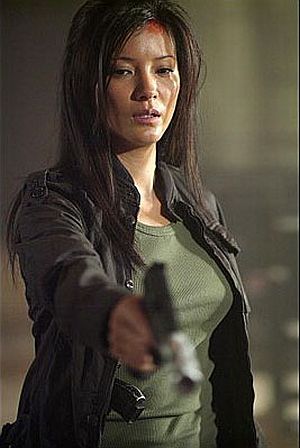 Every seven years, thirty of the world’s greatest assassins gather together for a battle. The winner gets $10 million, while bettors view the action remotely and gamble on the duels, face-offs and bloodbaths which ensue. Each assassin has a tracker implanted, and has a scanner where they can see the location of any other contestants nearby. This time, it’s in Middlesbrough, England, with reigning champion Joshua Harlow (Rhames) returning after he it told the murderer of his wife will be taking part. One of the 30 dumps their tracker into an alcoholic priest (Carlyle), who is “surprised”, shall we say, to become the target for the other 29. Lai Lai Zhen (Hu) realizes he’s an innocent, and vows to protect him, while also trying to win the competition.
Every seven years, thirty of the world’s greatest assassins gather together for a battle. The winner gets $10 million, while bettors view the action remotely and gamble on the duels, face-offs and bloodbaths which ensue. Each assassin has a tracker implanted, and has a scanner where they can see the location of any other contestants nearby. This time, it’s in Middlesbrough, England, with reigning champion Joshua Harlow (Rhames) returning after he it told the murderer of his wife will be taking part. One of the 30 dumps their tracker into an alcoholic priest (Carlyle), who is “surprised”, shall we say, to become the target for the other 29. Lai Lai Zhen (Hu) realizes he’s an innocent, and vows to protect him, while also trying to win the competition. So opens this rare example of British grindhouse. We don’t generally
So opens this rare example of British grindhouse. We don’t generally